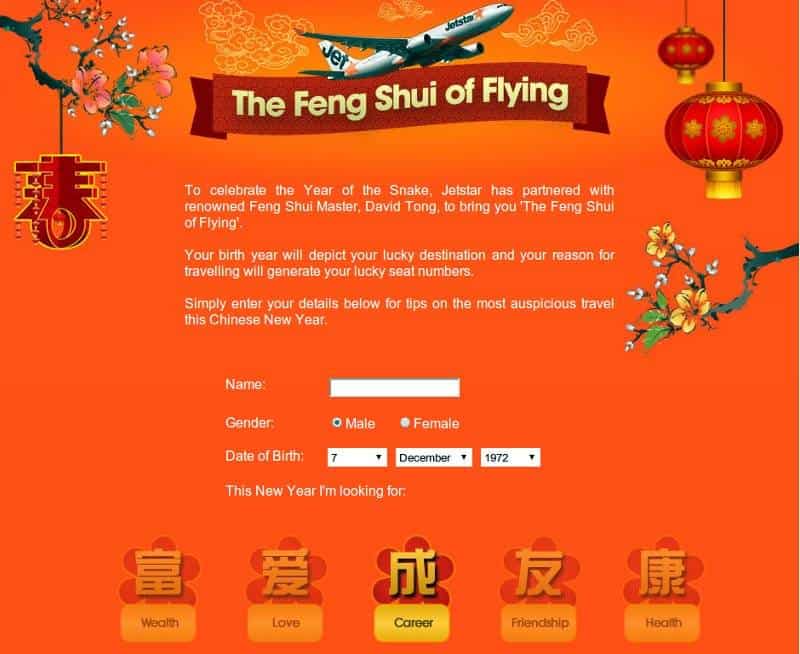Do you want a more comfortable flight filled with positive energy? Learn how Feng Shui can change your experience in the air. Jetstar Asia has already implemented it with surprising results. Find out which seats to choose and when to fly to maximize your well-being and prosperity.
Transform Your Flight: Principles of Feng Shui on Airplanes
Feng Shui is an ancient Chinese philosophy that seeks to harmonize the environment to improve vital energy, known as “chi.” With over 3,500 years of history, this practice translates literally as “wind and water.” Feng Shui is based on principles such as the arrangement of spaces, natural elements and orientation to create balance and well-being.
Originally, it was used to understand how changes in nature and climate affected people’s vital energy. Today, this practice has been adapted to various areas, including home decoration, office design and recently, airplanes.
Applying this philosophy in different spaces can help attract positive energy, improve health, foster relationships and increase prosperity. The basic principles of Feng Shui include the correct distribution of furniture, the use of specific colors and the incorporation of natural elements like water, wood, fire, earth and metal.
Jetstar Asia: Pioneer in Implementing Feng Shui on Flights

Jetstar Asia became the first airline to implement Feng Shui on airplanes. In honor of the Year of the Snake in 2013, the Singapore-based airline collaborated with Feng Shui master David Tong. Together, they analyzed the A320 fleet to optimize the flow of energy and improve passengers’ fortune during the flight.
This innovative study on airplanes seeks to determine the best rows of seats for different aspects of life, such as health, wealth and relationships. For example, men who wish to improve their health should sit in rows 9, 19, or 29, while women seeking wealth should choose rows 1, 11, or 21.
Additionally, Jetstar offered personalized recommendations through its website in 2013 and 2015. Passengers could enter their birth date to receive seat suggestions that would bring them well-being according to their Chinese zodiac sign.
This personalized, Feng Shui-based approach promised to transform the flight experience by aligning the environment’s energy with the individual needs of passengers.
How to Apply Feng Shui Principles to Seats and Flight Schedules
Feng Shui on airplanes involves adapting its traditional principles to seat configuration and flight schedules. These principles aim to optimize the flow of energy and enhance the passenger experience during the flight.
One key principle is seat selection. According to Feng Shui, different rows of seats can influence specific aspects of life. For example, sitting in rows 6, 16, or 26 can attract prosperity, while rows 3, 13, or 23 are ideal for those seeking new friendships.
Another important principle is the flight schedule. Flying between 5 a.m. and 7 a.m. is considered particularly fortunate, as these times align with the day’s positive energy. Additionally, the orientation and arrangement of seats within the plane are designed to maximize passengers’ well-being and fortune.
Integrating these principles not only enhances passengers’ comfort and well-being but also creates a more harmonious and balanced environment on board. By following these Feng Shui-based recommendations, passengers can experience a greater sense of tranquility and positivity during their flights.
Does Feng Shui on Airplanes Really Work?
The effectiveness of Feng Shui on airplanes has generated diverse opinions. While some passengers report improvements in their well-being and fortune, others are more skeptical. Jetstar Asia, the first airline to apply Feng Shui, claims that its customers have noticed positive changes in their flight experience.
Experts argue that, just like in other spaces, proper arrangement and orientation can influence the flow of energy on an airplane. Sitting in the correct rows and choosing the right times to fly can bring benefits such as better health, more prosperity and more harmonious relationships.
On the other hand, some critics believe that the benefits of Feng Shui can be subjective and difficult to measure scientifically. However, even skeptics admit that following these practices can provide a sense of control and emotional well-being, which is still a positive outcome.
Ultimately, the decision to adopt this belief when boarding a plane is up to each individual. Those who believe in Feng Shui principles may find these practices a way to enhance their flight experience. For others, it may be an interesting curiosity that adds a touch of novelty to their travels.
The Future of Feng Shui in Aviation: Comfort and Well-being in the Air
Implementing the ancient philosophy of Feng Shui on airplanes represents a fascinating fusion between an ancient Chinese philosophy and the modern aviation industry. Applying these principles during flights can not only improve passengers’ comfort and well-being but also bring additional benefits such as prosperity and harmonious relationships.
Jetstar Asia has paved the way by being the first airline to adopt these practices, offering its customers a unique and personalized flight experience. Although the effectiveness of Feng Shui may be subjective, many passengers have reported positive experiences.
Whether you are a fervent believer in Feng Shui or simply curious to try something new, considering these principles for your next flight can add a touch of balance and positivity to your journey.





